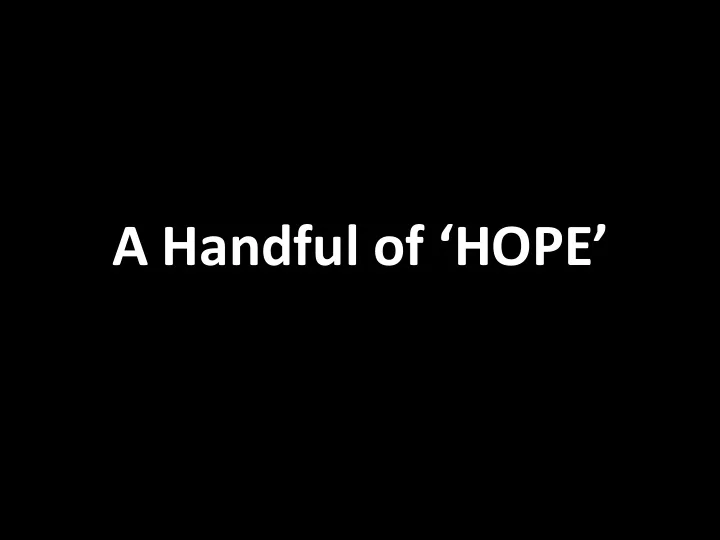

A Handful of ‘HOPE’
Nestled amidst the grandeur of the Himalayan ranges, Manali is a commercially driven town which witnesses a high influx of tourists. This diaspora of tourists attracts many unwelcome migrations all through the summer season. These migrations are a part and parcel of the life of many unfortunate and forlorn travellers who move from one place to another, not to admire the nature’s offering but to toil for bare necessities. Families and communities of such disconsolate drum makers, rag pickers and magicians move around the country in search of ways that absolve them of their ultimate state of penury.
The Human Welfare Society in Manali is a Non Governmental Organization that attempts to work towards improving the lives of the children of the seasonal migrants that move to Manali in the peak summer season from various regions of India (Rajasthan, Delhi, Mumbai, Chandigarh and Surat). They are supported by the Indian Development Foundation, Mumbai, in their endeavors of changing the lives of the people.
Setting up from scratch, these migrants try to earn a living by selling traditional products to the tourists, by showcasing their magic tricks and by rag picking. Being on the move does not allow them to set up permanent establishments thereby forcing them to live in tents near garbage dumps and open areas, which are extremely unclean. They live in unsanitary conditions essentially devoid of basic necessities towards leading a clean and hygienic life.
The children of these migrant workers are left to fend for themselves while their parents are out working. In order to add to the negligible income of their family, the children move around the town collecting garbage (particularly plastic bottles and recyclable cardboard boxes). Thus for this period of two-three months, the children do not attend any institutional education and bereft of an understanding of basic life skills.
Human Welfare Society works towards bridging this gap in the children’s education. They provide interim classes for non formal education to a group of 30-35 children during this limited period of 2 or 3 months in which they impart Basic English comprehension skills, numbers and rhymes. They also provide supplementary physical education and educate them on hygienic practices.
HOPE is the umbrella word under which all these educational activities are being carried out. HOPE signifies the vision with which this organization initiated its activities to provide for a better tomorrow for the underprivileged children.
“ P ehle ye aise hi ghumte the, kapde theek se nahi pehente the, gande rehte the, lekin ab thoda theek se rehne lage hain ” , says Deepak Sharma, the director of Human Welfare Society. According to him the challenge lay in convincing and building a relationship of trust with the families. The situation demanded time, patience and unwavering conviction from the devoted workers of the organization towards the cause.
There are about 15 to 20 families living in a state of destitution behind the Government Health Centre, Mall Road, Manali. One such family is that of Mir Jahan who hail from Barabanki district of Uttar Pradesh. They are traditional dholak-makers who have moved to Manali in order to sell their unique handmade drums. The 6 member family has set up in a tent in the area with other families.
Mir-Jahan, the youngest daughter of the family is a beneficiary of the HOPE project along with her elder brother. The 7 year old has shown remarkable improvement in her education and has also grown as an individual with HOPE tending her unique personality.
Mir-Jahan recalls of the days when she used to be involved with rag picking with other kids of her age. She would earn about Rs. 300 to 400 in a week by selling the recyclable plastic bottles and cardboard boxes. Quite natural to a child of her age, the money was spent on food rather being saved.
Mir- Jahan’s father Jalaluddin professes his helplessness at imparting a better life to his children. He values education as he has himself studied till class 7th. He expresses his deep understanding of the equation between poverty and illiteracy, which make a vicious circle of vulnerability and powerlessness. Therefore he appreciates the Human Welfare Society’s intervention. “Ye Log Humare bacchon ki zindagi bana rahe hain ”, says Jalaluddin.
Lata, the teacher at HOPE project sees the spark in Mir-Jahan which if nurtured could reach heights of success. She says, “ Mujhe Mir Jahan par zada dhyaan dena pada tha jisse vo kuda uthaana chhod ke padhna likhna seekhne lagi hai” . The teacher has studied the children in close proximity and has been an instrument of change in their lives.
Mir-Jahan has shown remarkable improvement in her writing skills and has imbibed good comprehension of English and Mathematics.
“ Humari beti padh likh kar hum jaisi nahi banegi, humare paas to bolne ko ek makaan bhi nahi hai ”, says Mir- Jahan’s mother Shanno, the pride in her eyes is evident when she fondly looks at her youngest daughter studying. This emphasis on a girl’s education showcases the success of the HOPE project, as these migrant worker communities hardly associate any importance to education per se.
Mir- Jahan’s story of change is just one example among the many beneficiaries of the HOPE project. It reflects upon a child’s ability to come out such societal vices if provided with a helping hand and right direction….and perhaps HOPE.
By: NAZIA NASREEN SWARNJEET KALINDI
Recommend
More recommend